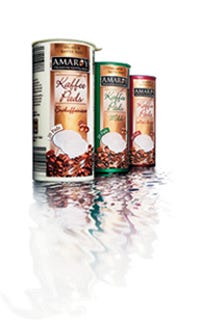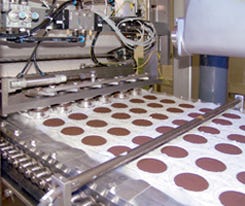New package for coffee pods
 Coffee pods, which are individual, single-serving packets of product, enable endusers to make single cups of different flavored hot drinks in a single coffee maker. However they also present a challenge to the producers, because for optimum results, the pods should not be smashed or folded, and the product should not be exposed to oxygen. German super-market chain Aldi Süd has had coffee pods for a number of years, but in December 2006, Aldi switched its Amaroy brand coffee pods from a flexible pouch to a flexible can, based on the Cyclero® flexible packaging concept from Huhtamaki (www.cyclero.com). Cyclero is basically a logical optimization of conventional standup pouches without the sealed side seams. The packages can be produced in a range of shapes, but the Amaroy can is round with a rigid snap-on lid and holds 20 coffee pods. Huhtamaki Ronsberg (www.huhtamaki.de) won an Alufoil Trophy 2007 for the Amaroy package, which is the first market use of this technology. The Alufoil Trophy contest, the only international aluminum foil competition for the industry, is annually awarded by the European Aluminum Foil Association. Head judge David Smith, Kraft Foods’ director, Packaging Global Technology and Quality International, described the pack as a “very creative, lightweight, hermetic pack, blending rigid and flexible packaging options, promising a lot of future opportunities across a wide range of products.” Martin Hauck, marketing director, Flexibles Europe, Huhtamaki Ronsberg, says, “Winning the award was important, as we have launched a completely new, innovative and revolutionary concept for the flexible packaging and aluminum foil sector.”
Coffee pods, which are individual, single-serving packets of product, enable endusers to make single cups of different flavored hot drinks in a single coffee maker. However they also present a challenge to the producers, because for optimum results, the pods should not be smashed or folded, and the product should not be exposed to oxygen. German super-market chain Aldi Süd has had coffee pods for a number of years, but in December 2006, Aldi switched its Amaroy brand coffee pods from a flexible pouch to a flexible can, based on the Cyclero® flexible packaging concept from Huhtamaki (www.cyclero.com). Cyclero is basically a logical optimization of conventional standup pouches without the sealed side seams. The packages can be produced in a range of shapes, but the Amaroy can is round with a rigid snap-on lid and holds 20 coffee pods. Huhtamaki Ronsberg (www.huhtamaki.de) won an Alufoil Trophy 2007 for the Amaroy package, which is the first market use of this technology. The Alufoil Trophy contest, the only international aluminum foil competition for the industry, is annually awarded by the European Aluminum Foil Association. Head judge David Smith, Kraft Foods’ director, Packaging Global Technology and Quality International, described the pack as a “very creative, lightweight, hermetic pack, blending rigid and flexible packaging options, promising a lot of future opportunities across a wide range of products.” Martin Hauck, marketing director, Flexibles Europe, Huhtamaki Ronsberg, says, “Winning the award was important, as we have launched a completely new, innovative and revolutionary concept for the flexible packaging and aluminum foil sector.”
The eight-color, rotogravure-printed, oriented polypropylene/polyethylene terephthalate/foil/polypropylene (OPP/PET/foil/PP) laminated container offers improved product protection and real differentiation at point of sale. It is easy to open and reclose, while the rounded body is tactile and comfortable to hold and is stable on the shelf. The round, semi-rigid Cyclero® package also prevents damage to the coffee pods during filling, in-transit and on the shelf. The packs feature a valve situated in the bottom of the pack, to allow carbon dioxide to escape. Another advantage of the Cyclero package is that its optimum product-content enables twice the weight of coffee pods to be loaded on a pallet compared with conventional coffee pouches.

The linear form/fill/seal system has dosing devices for coffee, with optional additional dosing systems for decaffeinated coffee, flavors, sugar and other components. The machine at Aldi produces 900 filtered-paper coffee pods/min.
The Cylclero package is produced from film in the newly developed SoftCan machine from the Optima Group (www.optima-packaging-group.de). The SoftCan concept is the result of a cooperative development process of Optima, Huhtamaki and Aldi. The project started as an idea of what the the container should look like, after which Optima’s machine solution and Huhtamaki’s film material were developed in a continuous optimization process. Every change in a material property or in a machine function required changes in many other areas of the overall concept. In the SoftCan process, the film is cut from a roll and a rectangular piece is formed into a tube on a mandrel, where it is ultrasonically welded into its cylindrical shape using ultrasonic sealing technology from Herrmann Ultrasonics, Inc. (www.herrmannultrasonics.com). Next, the bottom is sealed into the tube, and a valve is inserted into the bottom to allow the gases released by the coffee to vent. The SoftCan machine then reinforces the film tube on its upper inner rim with a plastic ring, ensuring the stability of the pack even when it is opened. Thus, when using a Cyclero package, consumers have a soft can that gives way when pressed in their hands. The ring also provides excellent resealing properties. The lid actually snaps back into the can when it is closed.
Simultaneously, 900 coffee pods/min are being produced on an Optima CFL filler. The filler stacks the pods in magazines that travel to the SoftCan machine, which inserts 20 pods into each Cyclero package. To improve its shelf life, the can containing the coffee pods is flushed with an inert gas before the plastic lid is inserted and sealed to the ring.
The finished packages then go through a check-weighing station on the filler to ensure that each package contains the correct number of coffee pods and meets the listed weight. Finally, in the last station on the SoftCan machine, the sell-by date is printed on the bottom of the package.
More information is available: |
Huhtamaki, 913/583-3025. www.cyclero.com. |
Huhtamaki Ronsberg, 49-08306770. www.huhtemaki.de. |
The Optima Group, 49-719558090.www.optima-packaging-group.de. |
Herrmann Ultrasonics, Inc., 630/626-1626.www.herrmannultrasonics.com. |
About the Author(s)
You May Also Like


